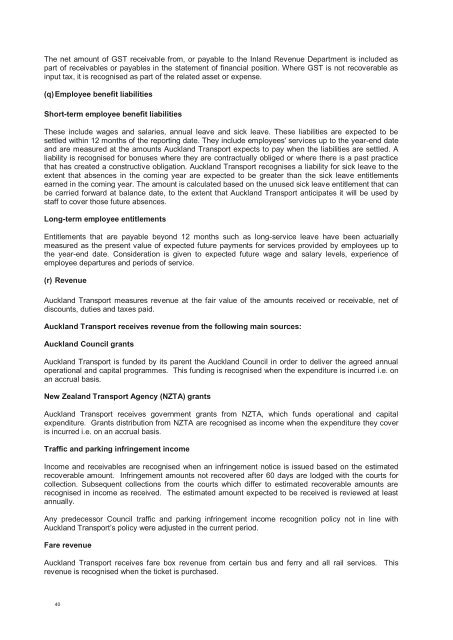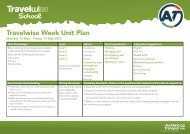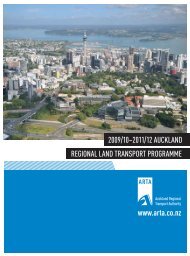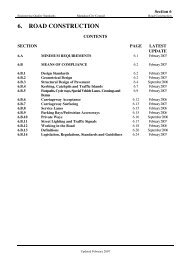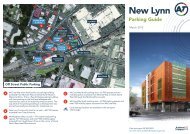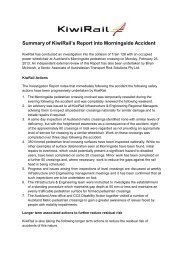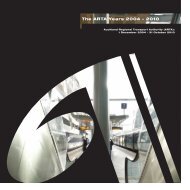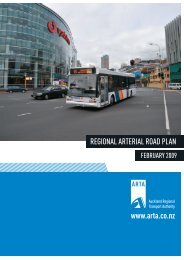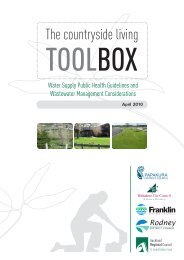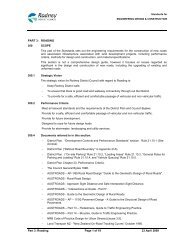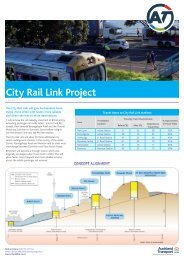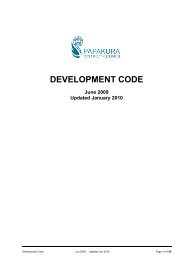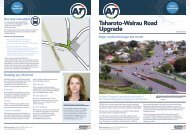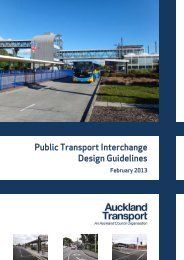Auckland Transport Statement of Intent 2012 - 2015
Auckland Transport Statement of Intent 2012 - 2015
Auckland Transport Statement of Intent 2012 - 2015
You also want an ePaper? Increase the reach of your titles
YUMPU automatically turns print PDFs into web optimized ePapers that Google loves.
The net amount <strong>of</strong> GST receivable from, or payable to the Inland Revenue Department is included as<br />
part <strong>of</strong> receivables or payables in the statement <strong>of</strong> financial position. Where GST is not recoverable as<br />
input tax, it is recognised as part <strong>of</strong> the related asset or expense.<br />
(q) Employee benefit liabilities<br />
Short-term employee benefit liabilities<br />
These include wages and salaries, annual leave and sick leave. These liabilities are expected to be<br />
settled within 12 months <strong>of</strong> the reporting date. They include employees' services up to the year-end date<br />
and are measured at the amounts <strong>Auckland</strong> <strong>Transport</strong> expects to pay when the liabilities are settled. A<br />
liability is recognised for bonuses where they are contractually obliged or where there is a past practice<br />
that has created a constructive obligation. <strong>Auckland</strong> <strong>Transport</strong> recognises a liability for sick leave to the<br />
extent that absences in the coming year are expected to be greater than the sick leave entitlements<br />
earned in the coming year. The amount is calculated based on the unused sick leave entitlement that can<br />
be carried forward at balance date, to the extent that <strong>Auckland</strong> <strong>Transport</strong> anticipates it will be used by<br />
staff to cover those future absences.<br />
Long-term employee entitlements<br />
Entitlements that are payable beyond 12 months such as long-service leave have been actuarially<br />
measured as the present value <strong>of</strong> expected future payments for services provided by employees up to<br />
the year-end date. Consideration is given to expected future wage and salary levels, experience <strong>of</strong><br />
employee departures and periods <strong>of</strong> service.<br />
(r) Revenue<br />
<strong>Auckland</strong> <strong>Transport</strong> measures revenue at the fair value <strong>of</strong> the amounts received or receivable, net <strong>of</strong><br />
discounts, duties and taxes paid.<br />
<strong>Auckland</strong> <strong>Transport</strong> receives revenue from the following main sources:<br />
<strong>Auckland</strong> Council grants<br />
<strong>Auckland</strong> <strong>Transport</strong> is funded by its parent the <strong>Auckland</strong> Council in order to deliver the agreed annual<br />
operational and capital programmes. This funding is recognised when the expenditure is incurred i.e. on<br />
an accrual basis.<br />
New Zealand <strong>Transport</strong> Agency (NZTA) grants<br />
<strong>Auckland</strong> <strong>Transport</strong> receives government grants from NZTA, which funds operational and capital<br />
expenditure. Grants distribution from NZTA are recognised as income when the expenditure they cover<br />
is incurred i.e. on an accrual basis.<br />
Traffic and parking infringement income<br />
Income and receivables are recognised when an infringement notice is issued based on the estimated<br />
recoverable amount. Infringement amounts not recovered after 60 days are lodged with the courts for<br />
collection. Subsequent collections from the courts which differ to estimated recoverable amounts are<br />
recognised in income as received. The estimated amount expected to be received is reviewed at least<br />
annually.<br />
Any predecessor Council traffic and parking infringement income recognition policy not in line with<br />
<strong>Auckland</strong> <strong>Transport</strong>‟s policy were adjusted in the current period.<br />
Fare revenue<br />
<strong>Auckland</strong> <strong>Transport</strong> receives fare box revenue from certain bus and ferry and all rail services. This<br />
revenue is recognised when the ticket is purchased.<br />
40


